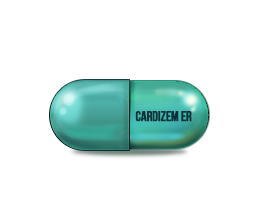Cardizem Er
 Cardizem
ER
- extended
release tablets with diltiazem. Antiarrhytmic action is caused by learned
suppression of transport of Ca2+ in heart tissues that leads to lengthening of
the effective refractory period and delay of carrying out in AV nodosity.
Hypotensive action is caused by dilatation of resistive vessels and decrease in
TPR. Extent of decrease in arterial blood pressure is correlated with its
initial level. It has the minimum influence on smooth mu
Cardizem
ER
- extended
release tablets with diltiazem. Antiarrhytmic action is caused by learned
suppression of transport of Ca2+ in heart tissues that leads to lengthening of
the effective refractory period and delay of carrying out in AV nodosity.
Hypotensive action is caused by dilatation of resistive vessels and decrease in
TPR. Extent of decrease in arterial blood pressure is correlated with its
initial level. It has the minimum influence on smooth mu
Ingrediente Activo: diltiazem
Disponible: En Stock (80 packages)
Cardizem Er, 120mg
| Paquete | Por Paquete | Pedir! | |
|---|---|---|---|
| 60 pills x 120mg | $1.81 | $108.60 | |
| 120 pills x 120mg | $1.35 |
|
|
180 pills x 120mg
Free airmail shipping |
$1.19 |
|
|
360 pills x 120mg
Free airmail shipping |
$1.04 |
|
Descripción De Producto
Packaging
Cardizem Er (Diltiazem)
What is Cardizem?
Cardizem (diltiazem) is a calcium channel blocker. It works by relaxing the muscles of your heart and blood vessels.
Cardizem is used to treat hypertension (high blood pressure). It may be used alone or in combination with other high blood pressure medications.
Cardizem is also used to treat chronic stable angina (chest pain) and angina due to coronary artery spasm.
Important information
You should not use Cardizem if you have very low blood pressure, a serious heart condition such as "sick sinus syndrome" or "AV block" (unless you have a pacemaker), or if you have recently had a heart attack and you have a build-up of fluid in your lungs.
Before taking Cardizem, tell your doctor if you have kidney disease, liver disease, or congestive heart failure.
Cardizem may impair your thinking or reactions. Be careful if you drive or do anything that requires you to be alert. Do not stop taking this medication without first talking to your doctor. If you stop taking this medicine suddenly, your condition may become worse.
Cardizem may be only part of a complete program of treatment that also includes diet, exercise, and other medications. Follow your diet, medication, and exercise routines very closely.
If you are being treated for high blood pressure, keep using this medicine even if you feel well. High blood pressure often has no symptoms.
Before taking this medicine
You should not use Cardizem if you are allergic to diltiazem, or if you have:
-
a serious heart condition such as "sick sinus syndrome" or "AV block" (unless you have a pacemaker);
-
very low blood pressure; or
-
if you have recently had a heart attack and you have a build-up of fluid in your lungs.
To make sure Cardizem is safe for you, tell your doctor if you have:
-
kidney disease;
-
liver disease;
-
congestive heart failure; or
-
if you also take digoxin, or a beta blocker (such as atenolol, carvedilol, metoprolol, propranolol, sotalol, and others).
It is not known whether Cardizem will harm an unborn baby. Tell your doctor if you are pregnant or plan to become pregnant.
Diltiazem can pass into breast milk and may harm a nursing baby. You should not breast-feed while using this medicine.
How should I take Cardizem?
Take Cardizem exactly as prescribed by your doctor. Follow all directions on your prescription label. Your doctor may occasionally change your dose to make sure you get the best results. Do not use this medicine in larger or smaller amounts or for longer than recommended.
Do not crush, chew, break, or open an extended-release tablet or capsule. Swallow it whole.
Use Cardizem regularly to get the most benefit. Get your prescription refilled before you run out of medicine completely.
You should not stop using Cardizem suddenly. Stopping suddenly may make your condition worse.
If you are being treated for high blood pressure, keep using this medicine even if you feel well. High blood pressure often has no symptoms. You may need to use blood pressure medicine for the rest of your life.
Your blood pressure will need to be checked often. You may also need frequent blood tests.
Store Cardizem at room temperature away from moisture and heat.
What happens if I miss a dose?
Take the missed dose as soon as you remember. Skip the missed dose if it is almost time for your next scheduled dose. Do not take extra medicine to make up the missed dose.
What happens if I overdose?
Seek emergency medical attention or call the Poison Help line at 1-800-222-1222. An overdose of diltiazem can be fatal.
Overdose symptoms may include slow heartbeat, weakness, chest pain, shortness of breath, or fainting.
What should I avoid while taking Cardizem?
Grapefruit and grapefruit juice may interact with diltiazem and lead to unwanted side effects. Discuss the use of grapefruit products with your doctor.
Cardizem may impair your thinking or reactions. Be careful if you drive or do anything that requires you to be alert.
Avoid drinking alcohol while taking diltiazem.
Avoid taking herbal supplements containing St. John's wort at the same time you are taking diltiazem.
Cardizem side effects
Get emergency medical help if you have signs of an allergic reaction to Cardizem: hives; difficult breathing; swelling of your face, lips, tongue, or throat.
Call your doctor at once if you have:
-
slow heartbeats;
-
pounding heartbeats or fluttering in your chest;
-
a light-headed feeling, like you might pass out;
-
heart problems - shortness of breath (even with mild exertion), swelling, rapid weight gain;
-
liver problems - nausea, upper stomach pain, itching, tired feeling, loss of appetite, dark urine, clay-colored stools, jaundice (yellowing of the skin or eyes); or
-
severe skin reaction - fever, sore throat, swelling in your face or tongue, burning in your eyes, skin pain followed by a red or purple skin rash that spreads (especially in the face or upper body) and causes blistering and peeling.
Common Cardizem side effects may include:
-
dizziness, weakness;
-
headache;
-
nausea; or
-
rash.
This is not a complete list of side effects and others may occur. Call your doctor for medical advice about side effects. You may report side effects to FDA at 1-800-FDA-1088.
What other drugs will affect Cardizem?
Many drugs can interact with diltiazem, and your doctor may need to change your treatment plan if you use certain other medicines. This includes prescription and over-the-counter medicines, vitamins, and herbal products.
Not all possible interactions are listed in this medication guide. Tell your doctor about all medicines you use, and those you start or stop using. Give a list of all your medicines to any healthcare provider who treats you.
Further information
Remember, keep this and all other medicines out of the reach of children, never share your medicines with others, and use this medicine only for the indication prescribed.
Packaging info
This is how your parcel will look like, the images are photographs of real shipments.
It has the size of a normal protected envelope and it does not disclose its contents.









